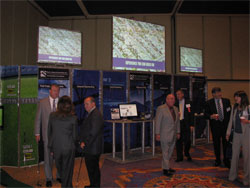Executing Documents with Powers of Attorney and Confessions of Judgment in PA Just Got Easier
October 27, 2016 —
Thomas C. Rogers, Nancy Sabol Frantz and Susan Fetterman – White and Williams LLPCertain tedious requirements in Pennsylvania for the execution of a document used in a commercial transaction which contains a power of attorney have been eliminated. Act 103 of 2016, which was signed by Governor Wolf on October 4, 2016, exempts certain powers of attorney from the requirement that it be acknowledged by a notary public as well as other formalities.
Reprinted courtesy of White and Williams LLP attorneys
Thomas C. Rogers,
Nancy Sabol Frantz and
Susan Fetterman
Mr. Rogers may be contacted at rogerst@whiteandwilliams.com
Ms. Frantz may be contacted at frantzn@whiteandwilliams.com
Ms. Fetterman may be contacted at fettermans@whiteandwilliams.com
Read the court decisionRead the full story...Reprinted courtesy of
Wildfire Risk Harms California Home Values, San Francisco Fed Study Finds
August 26, 2024 —
Laura Curtis - BloombergCalifornia’s wildfires are weighing on home prices more than in the past, and insurance availability does little to help in areas considered to be at higher risk, according to a Federal Reserve Bank of San Francisco study.
“Our results suggest that property values have been more adversely impacted in recent years by being close to past wildfires than was the case previously,” economists Leila Bengali, Fernanda Nechio and Stephanie Stewart wrote in a paper published Monday on the Fed bank’s website.
While the effect of the proximity may be relatively small now, the economists warned “this pattern may become stronger in years to come if residential construction continues to expand into areas with higher fire risk and if trends in wildfire severity continue,” the study cautioned.
Read the court decisionRead the full story...Reprinted courtesy of
Laura Curtis, Bloomberg
Nevada Senate Bill 435 is Now in Effect
February 24, 2020 —
Bremer Whyte Brown & O'Meara LLPATTENTION: Nevada liability departments and auto insurance carriers! Nevada Senate Bill No. 435 was recently signed into law and there are two key points to be aware of: Disclosure of Policy Limits Demand and Voiding Releases. These both deal with pre-litigation situations.
1) Nevada law now requires a motor vehicle insurer to disclose the limits of the policy if the claimant provides a HIPAA authorization which allows the carrier to “receive all medical reports, records and bills related to the claim from the providers of health care.” This is a change from the previous Nevada statute which required the disclosure of policy limits only after litigation was commenced.
However, it appears from the language of the statute that there are limits to this new mandate. Section 4 of the new law is written in such a way to allow the argument that the new law applies only to accidents that occurred after 10/1/19, and that the insurance company has to request the HIPAA waiver from the claimant in order for the disclosure requirement to apply.
The plaintiff’s bar is already attempting to address this language in the legislature. As written, subsection (4) is governed by subsection (1) which states that the insurance company “may require the claimant … to provide … a written authorization.” The following subparts all appear to be triggered only by the act of the insurance company requesting a HIPAA waiver. The plaintiff’s bar is pushing for clarifying language that would make it clear that once the claimant sent a HIPAA waiver, irrespective of whether the document was requested by the insurance company or not, the insurance company is required to disclose policy limits. This is not how the law reads on its face, and the change would make a significant difference from a practical perspective.
Read the court decisionRead the full story...Reprinted courtesy of
Bremer Whyte Brown & O'Meara LLP
Wake County Justice Center- a LEED Silver Project done right!
October 01, 2014 —
Melissa Dewey Brumback – Construction Law in North CarolinaYesterday evening, I had the privilege of attending the Triangle USGBC’s “Talk & Walk” at the Wake County Justice Center. The 576,996 square foot Justice Center was completed 6 months early and over 30 million under budget. (The final cost, including soft costs, came in at ~$141,000,000). Now that’s what I call a LEED project done right!
Interestingly, the County did not endeavor for a LEED Silver rating– the plan was to aim for a Certification. However, as the process unfolded, the Team kept meeting the goals and points for a Silver certification without any appreciable additional costs.
The end result? An “iconic but energy efficient building,” according to Tim Ashby, current Wake County Facilities Project Manager. Tim was initially involved in the Project while working at O’Brien Atkins, which served as the architecture firm for the Project under the direction of Architect Andrew Zwiacher.
Read the court decisionRead the full story...Reprinted courtesy of
Melissa Dewey Brumback, Construction Law in North CarolinaMs. Brumback may be contacted at
mbrumback@rl-law.com
Former Sponsor of the Lenox Facing Suit in Supreme Court
January 13, 2014 —
Melissa Zaya-CDJ STAFFLewis Futterman, former sponsor of the Lenox condominium in Harlem, New York, is being sued by the condo board for alleged “building code violations, construction defects, and fraud” according to New York Curbed. The residents claim that Futterman filed for bankruptcy in 2010 to avoid paying for repairs. The Lenox condo board filed suit in the New York Supreme Court last December 31st.
The Lenox’s condo board claims that the building has “fundamental structural flaws, a defective roof and pervasive leakage,” reports Rowley Amato of New York Curbed. The board also claims the original offering plans were not the same as the units purchased by residents in 2006. Residents paid an estimated two hundred and sixty thousand to repair defects within the condominium, and they are pursuing a minimum of four million in damages.
Katherine Clarke of The Real Deal stated that Futterman would only “say that the issue was between the residents and the construction company which built the project.”
Read the full story at New York Curbed...
Read the full story at The Real Deal...
Read the court decisionRead the full story...Reprinted courtesy of
Reminder: Your MLA Notice Must Have Your License Number
November 26, 2014 —
Christopher G. Hill – Construction Law MusingsRemember a couple of years ago when the Virginia mechanic’s lien rules changed to require inclusion of a claimant’s contractor’s license number (where a license is required)? If not, then this is a reminder of that particular wrinkle in the strictly interpreted mechanic’s lien statute. This requirement applies to all mechanic’s lien memoranda and, like all parts of this crazy statute, will invalidate a lien if not met. Well, another change to the statute happened with a bit less fanfare.
The change back in 2013 that came along with the license number requirement for a lien memorandum is a change in the mechanic’s lien agent notice requirement that applies to residential construction. The basic requirement, namely that those performing residential construction must notify any mechanic’s lien agent (“MLA”) listed on a building permit within 30 days of starting work that they are on the job and could file a lien, has not changed. What the amendments to the lien statutes in 2013 added was a requirement that the notice, like a lien memorandum, must include the contractor’s or subcontractor’s license number.
Read the court decisionRead the full story...Reprinted courtesy of
Christopher G. Hill, Law Office of Christopher G. Hill, PCMr. Hill may be contacted at
chrisghill@constructionlawva.com
City Potentially Liable for Cost Overrun on Not-to-Exceed Public Works Contract
June 29, 2017 —
David R. Cook Jr. - Autry, Hanrahan, Hall & Cook, LLPOn a public works construction project, a contractor incurred additional costs and asserted a claim against the city. The city denied the claim because the contract had a not-to-exceed price, and the city council and mayor did not approve contract modifications to exceed that amount. City ordinances require approval for contract modifications and change orders exceeding ten percent of the original not-to-exceed amount.
But the contractor argued that the ordinance did not apply because the excess costs did not result from a contract modification or change order. In addition, the contractor argued that, in refusing to approve an increase in the not-to-exceed amount, the city breached the implied duty of good faith and fair dealing. The court concluded that these questions were factual issues for the jury to decide.
Read the court decisionRead the full story...Reprinted courtesy of
David R. Cook, Autry, Hanrahan, Hall & Cook, LLPMr. Cook may be contacted at
cook@ahclaw.com
2011 West Coast Casualty Construction Defect Seminar – Recap
June 01, 2011 —
CDJ STAFF �  | �
�| Event exhibitors and sponsors contribute to an informative and engaging environment | �
�This year’s meeting was the best yet for the industry-leading construction defect and claims event.
�This year’s seminar concluded on May 13, 2011 with the Construction Defect Community Charitable Foundation Golf Tournament, held at Strawberry Farms Golf Course.
�The Disneyland Hotel in Anaheim, California was the place where more than 1,500 attendees convened for two days of professional development activities and seminars that included CLE workshops and panel discussions of special interest to legal and insurance professionals concerned with construction defect and claims litigation. Key events included “Challenges for Experts in Construction Defect Claims and Litigation,” “Keeping Up with Construction Defect Coverage,” and “Tips for Avoiding the ‘Perfect Storm’ in Handling of Wrap Claims.”
� �  | �
�| Supporting the golf tournament at the 15th hole | �
�This year’s Ollie award was given to George D. Calkins II, Esq. The West Coast Casualty Jerrold S. Oliver Award of Excellence was named in honor of the late Judge Jerrold S. Oliver, and recognizes an individual who is outstanding or has contributed to the betterment of the construction community.
�In addition to being the most comprehensive professional development seminar in the area of construction defects, this year’s seminar was equally valuable as a networking opportunity for members of the industry. People participated in professional development events during the day and then continued networking in the evening at numerous social events. The Lawn Party as well as the legendary Wood, Smith, Henning & Berman events were very well attended. Additional valuable networking events were hosted by a number of industry professionals at the House of Blues, and Tortilla Joe’s.
�As of this writing the 2011, West Coast Casualty's Construction Defect Seminar has applied for or has already received the following continuing education accreditation in the following areas;
�Read the full story…
�For more information about next year’s event, visit West Coast Casualty.
Read the court decisionRead the full story...Reprinted courtesy of




































































